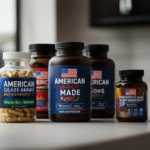Support our educational content for free when you purchase through links on our site. Learn more
How to Get All 13 Essential Vitamins: Your Ultimate Guide (2025) 🥦

Imagine waking up every day feeling energized, sharp, and ready to conquer the world—all because your body is fueled with the perfect balance of vitamins. But how do you actually get all 13 essential vitamins your body craves? It’s easier said than done, especially with conflicting nutrition advice swirling around. Whether you’re a busy professional, a health-conscious parent, or simply curious about optimizing your diet, this guide breaks down everything you need to know—from the top food sources to smart supplementation strategies.
Did you know that nearly 1 in 3 adults in the U.S. are deficient in at least one vital nutrient like Vitamin D or B12? (Source: NIH) That’s why understanding how to get all 13 vitamins isn’t just a nice-to-have—it’s essential for your long-term health. Stick with us as we unravel the secrets of the “Magnificent 13,” bust common myths, and reveal how to tailor your vitamin intake to your unique lifestyle.
Key Takeaways
- All 13 essential vitamins play unique roles in energy, immunity, brain function, and more.
- A varied, balanced diet rich in whole foods is your best foundation for vitamin intake.
- Fat-soluble vs. water-soluble vitamins require different absorption and storage strategies.
- Supplements can fill gaps but should be chosen wisely—quality and dosage matter.
- Personalized nutrition and tracking tools help optimize your vitamin levels.
- Beware of myths: More vitamins don’t always mean better health; balance is key.
Ready to start? Explore our curated selection of Multivitamin Supplements and Health Supplements to support your journey!
Table of Contents
- ⚡️ Quick Tips and Facts
- 📜 The Vitamin Vault: A Brief History of Nutritional Discovery
- 🔬 Understanding the “Magnificent 13”: What Are They and Why Do We Need Them?
- 🍽️ Your Plate, Your Powerhouse: Top Food Sources for Each of the 13 Essential Vitamins
- 1. Vitamin A: The Visionary 🥕
- 2. Vitamin C: The Immunity Booster 🍊
- 3. Vitamin D: The Sunshine Vitamin ☀️
- 4. Vitamin E: The Antioxidant Ace 🥑
- 5. Vitamin K: The Clotting Champion 🥦
- 6. Vitamin B1 (Thiamine): The Energy Spark Plug 🍞
- 7. Vitamin B2 (Riboflavin): The Cellular Dynamo 🥛
- 8. Vitamin B3 (Niacin): The Metabolic Maestro 🍗
- 9. Vitamin B5 (Pantothenic Acid): The All-Rounder 🍄
- 10. Vitamin B6 (Pyridoxine): The Brain’s Best Friend 🍌
- 11. Vitamin B7 (Biotin): The Beauty Builder 🥚
- 12. Vitamin B9 (Folate/Folic Acid): The Cell Creator 🥬
- 13. Vitamin B12 (Cobalamin): The Nerve Guardian 🥩
- 💊 Beyond the Plate: When Food Isn’t Enough – Supplementation Strategies
- 📉 Common Vitamin Deficiencies: Are You Missing Out?
- 🤝 The Synergy Secret: How Vitamins Work Together (and with Minerals!)
- 🧐 Debunking Vitamin Myths: Separating Fact from Fiction
- 🧬 Personalized Nutrition: Tailoring Your Vitamin Intake to Your Unique Needs
- 📊 Tracking Your Intake: Tools and Tips for Nutritional Awareness
- 🌟 The Vitamin Brands™ Promise: Our Commitment to Your Wellness Journey
- 🎉 Conclusion
- 🔗 Recommended Links
- ❓ FAQ
- 📚 Reference Links
Quick Tips and Facts
To get all 13 essential vitamins, it’s crucial to understand what they are and where to find them. Learn more about What are the 13 vitamins in order? to kickstart your journey to a healthier you. Here are some quick tips and facts to get you started:
- Eat a balanced diet: Focus on whole foods like fruits, vegetables, whole grains, lean proteins, and healthy fats.
- Variety is key: Include a wide range of foods in your diet to ensure you’re getting all the necessary vitamins and minerals.
- Supplements can help: If you’re struggling to get enough vitamins from food sources, consider consulting with a healthcare professional about supplements.
- Be mindful of deficiencies: Certain vitamins, like Vitamin B12, are more common to be deficient in, especially in older adults or those with restrictive diets.
Essential Vitamins and Food Sources
Some essential vitamins and their food sources include:
- Vitamin C: Found in citrus fruits, potatoes, and leafy green vegetables.
- Vitamin D: Found in fatty fish, fortified dairy products, and sunlight exposure.
- Vitamin E: Found in nuts, seeds, and vegetable oils.
The Vitamin Vault: A Brief History of Nutritional Discovery

The discovery of vitamins has a rich history, dating back to the early 20th century. Learn more about the Essential Vitamins that have been discovered and their importance in our diet.
Early Discoveries
- Vitamin A: First discovered in 1906, Vitamin A is essential for healthy vision, immune function, and skin health.
- Vitamin C: Discovered in 1920, Vitamin C is crucial for immune function, collagen production, and iron absorption.
Understanding the “Magnificent 13”: What Are They and Why Do We Need Them?
The 13 essential vitamins are vital for various bodily functions, from energy production to immune function.
Fat-Soluble vs. Water-Soluble: A Crucial Distinction
- Fat-Soluble Vitamins: Vitamins A, D, E, and K are stored in the body’s fat tissues and can be toxic in high amounts.
- Water-Soluble Vitamins: Vitamins C and B vitamins are not stored in the body and excess amounts are excreted in the urine.
Your Plate, Your Powerhouse: Top Food Sources for Each of the 13 Essential Vitamins
Here are the top food sources for each of the 13 essential vitamins:
- Vitamin A: The Visionary: Sweet potatoes, carrots, dark leafy greens, and fatty fish.
- Vitamin C: The Immunity Booster: Citrus fruits, strawberries, bell peppers, and broccoli.
- Vitamin D: The Sunshine Vitamin: Fatty fish, fortified dairy products, and sunlight exposure.
- Vitamin E: The Antioxidant Ace: Nuts, seeds, and vegetable oils.
- Vitamin K: The Clotting Champion: Leafy greens, such as spinach and kale.
- Vitamin B1 (Thiamine): The Energy Spark Plug: Whole grains, legumes, and nuts.
- Vitamin B2 (Riboflavin): The Cellular Dynamo: Dairy products, leafy greens, and whole grains.
- Vitamin B3 (Niacin): The Metabolic Maestro: Meat, fish, and whole grains.
- Vitamin B5 (Pantothenic Acid): The All-Rounder: Avocados, sweet potatoes, and broccoli.
- Vitamin B6 (Pyridoxine): The Brain’s Best Friend: Meat, fish, and whole grains.
- Vitamin B7 (Biotin): The Beauty Builder: Eggs, nuts, and leafy greens.
- Vitamin B9 (Folate/Folic Acid): The Cell Creator: Leafy greens, legumes, and fortified cereals.
- Vitamin B12 (Cobalamin): The Nerve Guardian: Animal products, such as meat, fish, and dairy.
Beyond the Plate: When Food Isn’t Enough – Supplementation Strategies
Sometimes, even with a balanced diet, supplements can be necessary to fill nutritional gaps.
Navigating the Supplement Aisle: What to Look For (and Avoid!)
When choosing supplements, consider the following:
- Look for third-party certification: Choose supplements that have been certified by organizations like NSF International or the National Science Foundation.
- Check the label: Ensure the supplement contains the necessary vitamins and minerals in the recommended amounts.
- Avoid fillers and additives: Opt for supplements with minimal ingredients and no artificial additives.
The “Right” Dose: Why More Isn’t Always Better
Taking too much of a vitamin can be toxic, so it’s essential to follow the recommended dietary allowance (RDA).
- Consult with a healthcare professional: Before taking any supplements, consult with a healthcare professional to determine the best course of action.
Who Might Need Supplements? Tailoring Your Nutritional Support
Certain individuals may require supplements due to dietary restrictions or health conditions.
- Pregnant women: May require additional folate and iron.
- Vegans and vegetarians: May require vitamin B12 and iron supplements.
- Older adults: May require vitamin D and calcium supplements.
Common Vitamin Deficiencies: Are You Missing Out?
Vitamin deficiencies can have severe health consequences, so it’s crucial to be aware of the signs and symptoms.
- Vitamin B12 deficiency: Can cause fatigue, weakness, and neurological problems.
- Vitamin D deficiency: Can cause bone health issues, such as osteoporosis.
The Synergy Secret: How Vitamins Work Together (and with Minerals!)
Vitamins often work in tandem with other nutrients to produce optimal health benefits.
- Vitamin C and iron: Vitamin C enhances iron absorption.
- Vitamin D and calcium: Vitamin D helps the body absorb calcium for healthy bone growth.
Debunking Vitamin Myths: Separating Fact from Fiction
There are many misconceptions about vitamins and supplements.
- Myth: Taking high doses of vitamins is harmless. Fact: Excessive vitamin intake can be toxic.
- Myth: All supplements are created equal. Fact: Supplements can vary in quality and efficacy.
Personalized Nutrition: Tailoring Your Vitamin Intake to Your Unique Needs
Everyone’s nutritional needs are different, and personalized nutrition can help optimize vitamin intake.
- Consult with a healthcare professional: Determine the best course of action for your individual needs.
- Consider genetic testing: Genetic testing can help identify potential nutritional deficiencies.
Tracking Your Intake: Tools and Tips for Nutritional Awareness
Staying on top of your vitamin intake can be challenging, but there are tools and tips to help.
- Use a food diary: Track your daily food intake to ensure you’re getting the necessary vitamins and minerals.
- Consult with a registered dietitian: A registered dietitian can help you create a personalized nutrition plan.
The Vitamin Brands™ Promise: Our Commitment to Your Wellness Journey
At Vitamin Brands, we’re dedicated to providing high-quality supplements and expert guidance to support your health and wellness journey.
- 👉 Shop our selection of Health Supplements: Find the perfect supplement to support your unique needs.
- Explore our Multivitamin Supplements: Discover the benefits of multivitamins for overall health and wellness.
- Learn more about Best Vitamins for Women: Find the best vitamins and supplements tailored to women’s health needs.
- Check out our Best Vitamins for Men: Discover the top vitamins and supplements for men’s health and wellness.
Conclusion

Getting all 13 essential vitamins is not just a health goal—it’s the foundation of vibrant living. As we’ve explored, a balanced diet rich in diverse whole foods is your best bet to cover these nutritional bases. However, life happens: busy schedules, dietary restrictions, or certain health conditions can make it tricky to get everything from food alone. That’s where smart supplementation steps in as your nutritional safety net.
Remember, more isn’t always better—vitamins work best in harmony and in the right amounts. Overdoing fat-soluble vitamins like A or D can backfire, so always aim for balance and consult healthcare professionals when considering supplements.
At Vitamin Brands™, we’re passionate about helping you navigate this vitamin maze with confidence, whether through food or trusted supplements. So, whether you’re a veggie lover, a meat enthusiast, or somewhere in between, you can confidently fuel your body with the “Magnificent 13” and unlock your healthiest self. Ready to take the next step? Your wellness journey awaits!
Recommended Links
👉 Shop Top Multivitamin Supplements on:
- Garden of Life Multivitamin: Amazon | Walmart | Garden of Life Official Website
- Nature Made Vitamin B Complex: Amazon | Walmart | Nature Made Official Website
- NOW Foods Vitamin D3: Amazon | Walmart | NOW Foods Official Website
Recommended Books:
- “The Vitamin D Solution” by Dr. Michael F. Holick — Amazon
- “Eat to Beat Disease” by Dr. William W. Li — Amazon
- “The Complete Guide to Vitamins, Minerals and Supplements” by Dr. Amanda Ursell — Amazon
FAQ

What are the 13 essential vitamins and their functions in the body?
The 13 essential vitamins include Vitamins A, C, D, E, K, and the B-complex group (B1, B2, B3, B5, B6, B7, B9, B12). Each plays unique roles:
- Vitamin A supports vision and immune health.
- Vitamin C is an antioxidant aiding tissue repair and iron absorption.
- Vitamin D helps calcium absorption for bone strength.
- Vitamin E protects cells from oxidative damage.
- Vitamin K is critical for blood clotting and bone metabolism.
- B Vitamins fuel energy metabolism, brain function, red blood cell formation, and DNA synthesis.
For detailed functions and food sources, check our Essential Vitamins category.
Read more about “How Many Recognized Vitamins Are There? Discover All 13! 🥦”
Can I get all the necessary vitamins from food alone or do I need supplements?
✅ Yes, it’s possible to get all essential vitamins from a well-planned diet rich in fruits, vegetables, whole grains, lean proteins, and healthy fats. However, factors like age, pregnancy, dietary restrictions (e.g., veganism), or medical conditions may increase your vitamin needs or limit absorption.
❌ Supplements become beneficial or necessary when dietary intake falls short or specific health needs arise. For example, Vitamin B12 is primarily found in animal products, so vegans often require supplementation. Similarly, Vitamin D deficiency is common in regions with limited sun exposure.
Consult a healthcare provider to tailor your approach.
What are the symptoms of vitamin deficiency and how can they be prevented?
Vitamin deficiencies manifest in diverse ways depending on the vitamin:
- Vitamin D deficiency: Bone pain, muscle weakness.
- Vitamin B12 deficiency: Fatigue, numbness, memory issues.
- Vitamin C deficiency: Bleeding gums, slow wound healing.
- Vitamin A deficiency: Night blindness, dry skin.
Prevention hinges on a balanced diet, regular health screenings, and supplementation if advised. Early detection is key to avoiding long-term complications.
Read more about “What Are the 10 Most Popular Vitamins? Discover Their Benefits! 🌟”
Are there any specific vitamin combinations or supplements that can help fill nutritional gaps in my diet?
Yes! Multivitamin supplements are designed to cover a broad spectrum of vitamins in balanced amounts, making them a convenient option for many. Some targeted combinations include:
- B-Complex vitamins for energy and brain health.
- Vitamin D + Calcium for bone support.
- Vitamin C + Iron to enhance iron absorption.
Always choose supplements with transparent labeling and third-party testing, like those from Garden of Life or Nature Made, and discuss with your healthcare provider.
How does vitamin absorption vary between food sources and supplements?
Vitamin absorption can differ significantly:
- Natural food sources often provide vitamins alongside cofactors and fiber, enhancing absorption and utilization.
- Supplements may offer higher doses but sometimes lack these synergistic compounds.
- Fat-soluble vitamins (A, D, E, K) require dietary fat for optimal absorption, whether from food or supplements.
- Water-soluble vitamins (B-complex, C) are generally absorbed quickly but not stored extensively.
Balancing both food and supplements, when needed, ensures optimal nutrition.
Read more about “Which Company Is Best for Vitamin A? Top 10 Brands Reviewed (2025) 🥇”
Reference Links
- Harvard Health Publishing: The Best Foods for Vitamins and Minerals
- MedlinePlus: Vitamins
- National Institute on Aging: Vitamins and Minerals for Older Adults
- Garden of Life Official Website
- Nature Made Official Website
- NOW Foods Official Website
Ready to take charge of your vitamin intake? Dive deeper into our Multivitamin Supplements and start your journey toward optimal health today!







